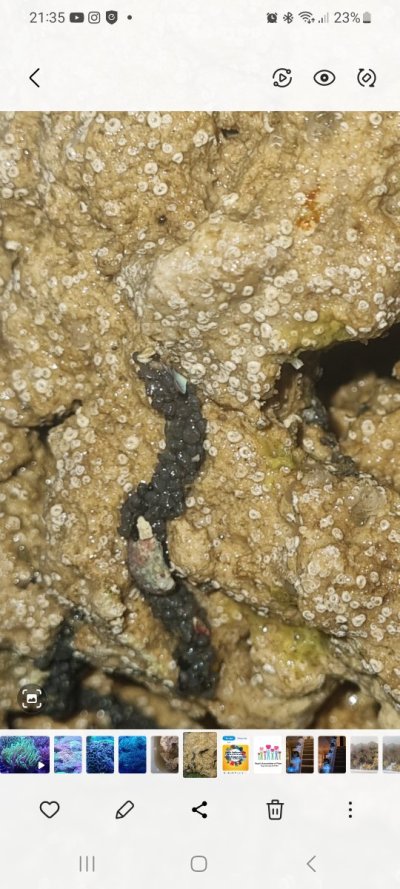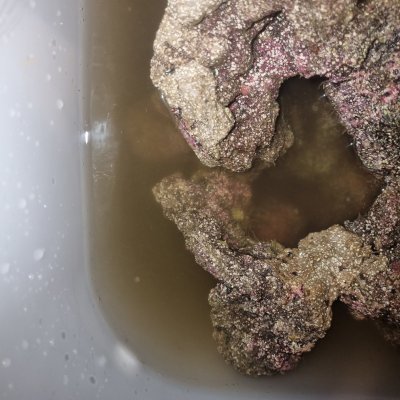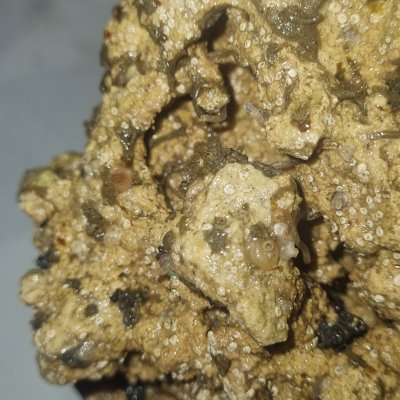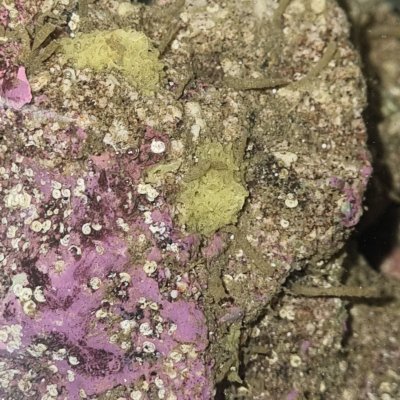I've just had a look and there is alot of yellow sponge on the rocks, the test was salifert and just wanted to test before I added the hermitYou don't have to add bacteria. The rock likely contains much more than anything that you could add from a bottle. The .5 nh4 was likely just a testing error unless you had a really good test kit and not something like API.
Navigation
Install the app
How to install the app on iOS
Follow along with the video below to see how to install our site as a web app on your home screen.
Note: This feature may not be available in some browsers.
More options
You are using an out of date browser. It may not display this or other websites correctly.
You should upgrade or use an alternative browser.
You should upgrade or use an alternative browser.
Bought live rock that stinks and dirty - black egg like things
- Thread starter jezz2001uk
- Start date
- Tagged users None
You don't have to add bacteria. The rock likely contains much more than anything that you could add from a bottle. The .5 nh4 was likely just a testing error unless you had a really good test kit and not something like API.
The sponge is great. Feed that hermit a bit while in the bucket. All is good.
this is the yellow sponge, some say its good others say it leaks toxins. Its so difficult to know what's good or badI've just had a look and there is alot of yellow sponge on the rocks, the test was salifert and just wanted to test before I added the hermit
Attachments
The sponge is great. Feed that hermit a bit while in the bucket. All is good.
As a general rule of thumb, if it lives in the ocean, doesn't move, and doesn't have some sort of physical protection (like barnacles and clams have shells they can close to protect them), then they most likely have chemical protections (i.e. toxins) like soft corals:this is the yellow sponge, some say its good others say it leaks toxins
To preface this, I’m not an expert - I’ve been doing a lot of reading up sponges, but I’m not an expert. So, with that out of the way, I know this is vague and somewhat unhelpful, but it depends on the sponge.
Some sponges are highly toxic, some moderately toxic, some mildly toxic, and some not toxic at all. Generally speaking though, sponges produce toxins to avoid predation and/or parasites, or (like some corals) as a form of chemical warfare to compete for territory. With these toxins, some of them are specifically anti-fish, some anti-echinoderm, some anti-parasite, some anti-coral, etc. As I understand it, some of these toxins are deadly to other marine species, and some just make the sponge taste bad or be less preferred by predators.
To address your actual questions now, though, some sponges constantly put out toxins (I know this one has been demonstrated), I’ve heard but can’t at this moment confirm that some might only put out toxins if disturbed/threatened (as you suggested in your post) and some might only be toxic if eaten (this one I find highly likely, but, again, I can’t confirm it at present), and - as mentioned above - some species aren’t toxic at all, so they don’t put out toxins period.
Whether or not a sponge’s toxins are harmful to fish, corals, etc. is - as I hinted at above - dependent on the toxins produced by the sponge and the quantity produced. To give an idea here, sea cucumber toxins (known as holothurin) are ichthyotoxins, meaning they are primarily toxic to fish. So, if a sea cucumber releases their toxins into a tank at a low dose, the fish in the tank will likely suffer (and possibly die) even though the amount of toxin is small, but other inhabitants will likely be unaffected. At a high dosage, however, these other inhabitants may suffer (and/or die) as well.
So, if a sponge produces fish or coral specific toxins, those may suffer or die even if the amount of toxin produced is small. Similarly, if the toxin produced is not a coral or fish specific toxin but the sponge produces a large amount of it, those might still suffer or die regardless.
I’ve never heard of a fish dying from just swimming by a toxic sponge (I’ve only heard of fish dying from eating highly toxic sponges in a laboratory, force-feeding setting at the moment), so I would assume that sponge toxicity is not a big concern under normal circumstances. If you happen to have a highly toxic (either in potency or quantity) sponge that is not being eaten, however, I suppose it’s possible it could pose some health concerns for your tank’s inhabitants, particularly if you don’t do regular water changes or run carbon.
Now, all of that said, I would guess that, in most circumstances, sponges in our tanks are probably either mildly toxic (probably edible but not preferred as a food) or only seriously toxic when consumed (and most tank inhabitants, being chemically sensitive, would likely know better than to eat highly toxic sponges). So, I would guess that in the overwhelming majority of cases, the sponges in our tanks are essentially perfectly reef safe and harmless (though, much like many soft corals, I suspect they would engage in manageable levels of chemical warfare for space in the tank - in that regard I guess you could argue that they are detrimental to corals). This is just a guess, but - like WheatToast - I’ve never heard of a sponge’s toxins causing issues in a tank.
Also, for anyone who’s interested, only a handful of sponges are really considered toxic to humans - they basically give an itchy, painful, swollen rash when touched (contact dermatitis), usually a few hours to days after the contact is made.
The sponges, worms and starfish are a great sign that this was diverse rock.
I have sponge all over my tank where the fish cannot get to them - the angelfish love to eat it. Sump is full of sponge too.
Test the po4 when you get a chance. You might want to use some LC on the rock to lower the bound po4 before you add it to a tank.
I have sponge all over my tank where the fish cannot get to them - the angelfish love to eat it. Sump is full of sponge too.
Test the po4 when you get a chance. You might want to use some LC on the rock to lower the bound po4 before you add it to a tank.
Do not bleach. Rinse in old water from your tank. it would be very silly to bleach. Bumble bee snails are supposed to eat vermitid snails. But most of the aquarium cycle somehow until they get stabilized. At one time I had a lot of these vermitid snails, but I have less now, I do not know why.
I'd soak it in aerated, heated saltwater & change it out a few times .will be some goodness in amongst the funk!Today I picked up 6kg of live rock from a lfs closing down for £40 I thought I'd done well but now feel I've been had
Bad news is it seems to have some Vermetid snails and it absolutely stinks (fishy) and the clean saltwater i placed it in has gone very dirty. why?
I'm going to have it stood for atleast a month in a bucket with a powerhead so....
1st question is, was this a bargain?
2.What are these black egg looking things?
3.How many bumble bee snails and crabs should I add to the bucket to take care of the virmetid snails and aid cleaning ?
4.. Should I look out for anything else?




Always intrigued by the categories as it's rare to even be offered the option of proper live in my area in UK.That rock already looks like it has been cleaned or at least was not super dirty. There is no fibrous algae or coralline on it. Do you see any pods, worms or starfish? We would call this base rock in the olden days. It also could have been dry/dead that was just made wet recently. Who knows.
I am sure that it has a bunch of different kinds of bacteria and stuff.
6kg for £40 is fine even if it is base rock.
Is base rock just dry rock e.g AF/Caribsea etc etc that's been in an active system & matured?
If so I guess that's what I have lol
Similar threads
- Replies
- 6
- Views
- 249
- Replies
- 13
- Views
- 526
- Replies
- 22
- Views
- 570
- Replies
- 6
- Views
- 431
New Posts
-
Controlling Mobius enabled VorTech pump using 0-10V (and BLE)
- Latest: Sisterlimonpot
-
-

















